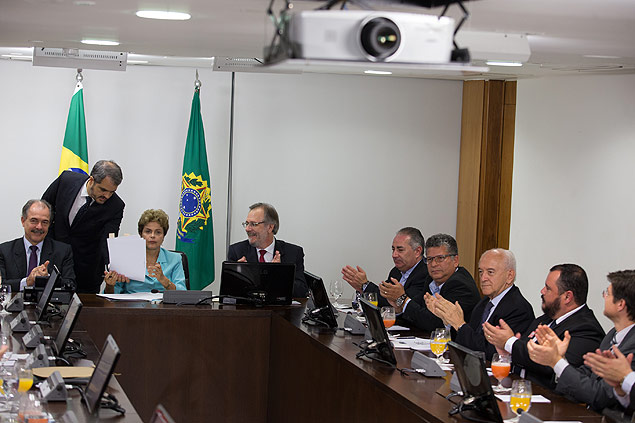Latest Photo Galleries
Brazilian Markets
17h38 Bovespa |
+1,50% | 126.526 |
16h43 Gold |
0,00% | 117 |
17h00 Dollar |
-0,93% | 5,1156 |
16h30 Euro |
+0,49% | 2,65250 |
ADVERTISING
Government Creates Plan to Reduce Work Hours and Wages to Beat Unemployment Rate
07/07/2015 - 08h55
Advertising
SOFIA FERNANDES
MARINA DIAS
FROM BRASÍLIA
Faced with a scenario of economic slowdown and layoffs -more than 240 thousand job vacancies have been closed this year- President Dilma Rousseff decreed on Monday, July 6th, the creation of a program to keep employment under control in the country.
The so-called Employment Protection Program is expected to bring down the number of working hours by at least 30%, with a proportional reduction in the wages in critical times, for the maximum of one year.
The program which will begin on Tuesday, July 7th, with the publication of a provisional measure, was the result of negotiations between trade unions, the industries and government.
The government's proposal is to complement half of what workers would miss of their incomes with funds from the Workers' Support Fund, totaling a loss of 15% of their salary.
The government's funds will not exceed R$ 900.84 (US$286.70), equivalent to 65% of the highest paying unemployment benefit. This implies that salaries above R$ 6,000 (US$ 1,900) will have a smaller proportional help from government.
The government's idea is that companies, especially in critical sectors such as the industries avoid layoffs, saving the government to pay more benefits and lose revenue from taxes and social contributions.
COST
The program will run until the end of 2016. Companies have until December of this year to join the program. According to Miguel Rossetto, Minister of the General Secretariat of the Presidency, spending on the program outweighs the reimbursements that the government would have to pay with unemployment benefits.
"It is more intelligent if we use public funds to maintain employment rates than if we finance unemployment," Rossetto said.
Planning Minister Nelson Barbosa said he hoped that the program protects employment rates in sectors that are making "temporary" adjustments, and the industry is a sector which he highlights. "I trust there will be a recovery for the Brazilian economy," he said.
According to Barbosa, the program will not turn up costs and will help in the fiscal balance. In a scenario where 50,000 workers join the program, the government estimates savings of R$ 68 million (US$ 21 million) - the difference between what would be spent on unemployment benefits and reimbursements for the program.
A company can only take part in the program in times of cyclical or systemic economic crisis, which must be proven by the company to the trade union and the federal government. An economic problem cannot be motivated by mismanagement.
Companies that join the program cannot dismiss employees who reduced their workday in the period of alternative working hours. At the end of the program, the worker cannot be fired for a period equivalent to one third of the membership period.
An inter-ministerial committee will determine in the next 15 days, the economic and financial indicators for the classification of sectors and companies in the program.
A reduction will only be accepted if there is agreement between the relevant trade union and the company through an assembly. Agreements will be made company by company. There will be no acceptance or refusal of specific workers to the program.
Translated by CRISTIANE COSTA LIMA
Read the article in the original language
| Ed Ferreira/Folhapress | ||
 |
||
| Dilma Rousseff decreed on Monday, July 6th, the creation of a program to keep employment under control in Brazil |



